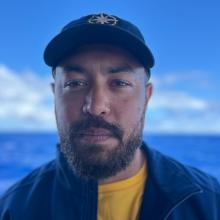
Antony Vavia
Tell us about your work/research. What kinds of things do you do?
My research interests focus on Pacific Islands coastal reef fisheries, particularly small-scale subsistence- and artisanal fisheries that sustain coastal communities throughout the region. By "trade," I am a marine biologist, but my work has adopted Indigenous Research approaches to understand traditional ecological knowledge, people, and culture, and how these intersect with marine resources. I've had the privilege to live where I was doing my fieldwork, allowing for a far more enriching learning experience on a small and remote island. While quantitatively collecting fisheries data, I was collecting my life experiences as qualitative data too. It was a very wholesome and rewarding research on the island of Mitiaro, Cook Islands.
What sparked your initial interest in your career?
My dad raised me doing all things outdoors, particularly in the ocean. He grew up in Fiji and lived off the sea and he imparted that passion and care onto me as I grew up in Aotearoa (New Zealand). When the time came during High School to take my career decisions seriously, all I knew was that I wanted something both adventurous and problem-solving. So my dad suggested a career in marine biology. It resonated with me so I stuck with it, and most of my interests involve the sea whether it be spearfishing, diving or sailing traditional canoes.
Who influenced you or encouraged you the most?
My mum, my nana (grandmother), and papa (grandfather,) and my sisters encouraged me. We call this sort of support our "why". They, alongside much more of my wider family and friends, are my "why".
What element of your work/study do you think is the most fascinating?
Over the years, I've become more inclined to the social aspects of fisheries research. It's incredibly fascinating to look at those diverse and unique relationships between people and their food and lifestyles. It makes sense to explore the human aspect of marine resource use because you simply cannot have a fishery without people. And when making management decisions about a resource, you don't manage the resource; you manage people.
How did you get involved with the Ocean Exploration Trust?
The marine science community in the Cook Islands is very small, and the marine opportunities are relatively scarce compared to other more developed nations. So it is a privilege to be invited to participate with OET and to be able to connect with new people and learn more things.
What other jobs led you to your current career?
The other "jobs" beyond my academic career pathway are a little diverse. In my early days, I spent time working in an environmental monitoring unit. I manufactured marine accessories for boats. I've been serving as a crew member on several voyages over the years on traditional sailing canoes (vaka). Cameraman and social media person for communications. Consulting on marine management and policy plans. Lecturing at university. Although a lot of my work involves sitting at a desk these days, I very much yearn to be outside.
What are your degrees and certifications?
Bachelor of Science (Hon) - Auckland University of Technology 2018
PhD - Auckland University of Technology 2024.
What are your hobbies?
I love going snorkelling and spearfishing, sailing on vaka, and 'trying' to make social media content through videography as a fun creative outlet. I also enjoy eating.
What advice would you give someone who wants to have a career like yours?
Besides the usual institutional standards and criteria of becoming a marine biologist, if your passion is to have your science to serve people, then I really encourage extending your interests beyond being a scientist. Be purpose-driven over practice-driven. Be ready and comfortable to unlearn what you think you know and allow a bit of creativity to take the wheel now and then - be open-minded to learning even if it doesn't make sense to begin with.
Expeditions
Antony participated in the following Ocean Exploration Trust expeditions:
